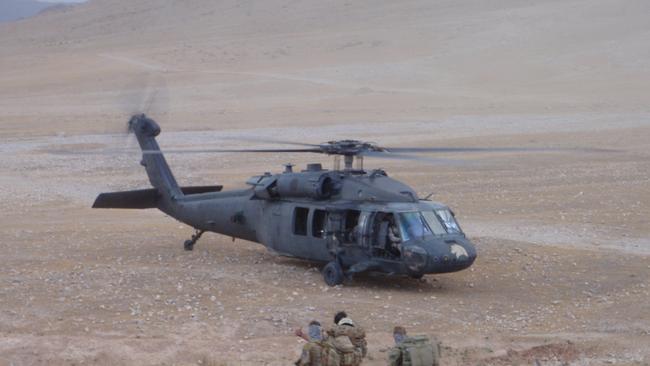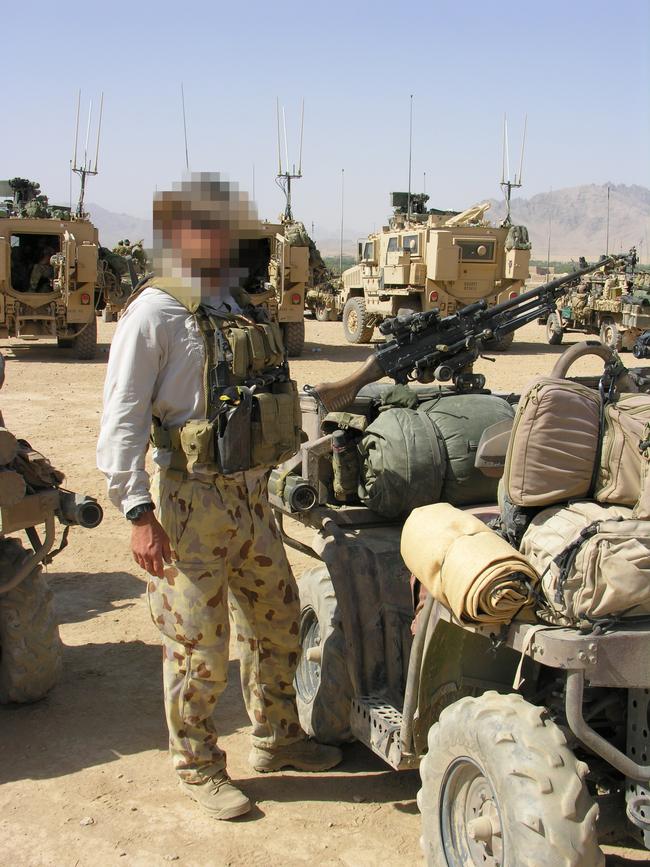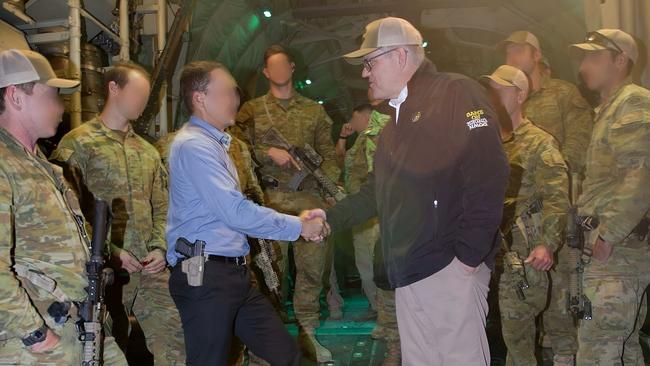Former Special Forces soldier Scott Ryder remembers very little from the deadly Black Hawk helicopter crash — except laying next to the body of his mate.
On 21 June 2010, they were crossing Northern Kandahar while flying towards a Taliban village when it crashed during its final approach to the landing zone into rugged Afghan terrain.
Four men lost their lives that night, but Mr Ryder miraculously survived.
“Those of us who survived all vividly recall the impact, but nothing more, due to our head injuries,” Mr Ryder, from NSW, said.
“I remember being slid over on the floor of an empty Black Hawk as bodies piled in around me.”
Seven Australian commandos were injured in the accident, which occurred while they were taking part in a disruption operation against insurgents.
The accident claimed the lives of Private Benjamin Chuck, 27, Private Timothy Aplin, 38, and Private Scott Palmer, 27, who were from the Sydney based 2nd Commando Regiment.
It was the largest loss of Australian lives in any single incident in almost a decade of the war.
The 40-year- old was the only survivor to return to active duty two years following the incident, overcoming severe spinal injuries, and serving for another 13 years.

“One memory I have is someone telling me we needed to make room for Chuck, and I tried to move over, but the pain in my legs and back wouldn’t allow me to move,” Mr Ryder said.
“I could feel Chuck’s body next to me, but I don’t remember seeing his face, or maybe my brain has shut it out.

“I didn’t know how I was the only survivor, and my whole team was dead … I never knew that grief and guilt could overcome a person with such a force so suddenly that your very existence becomes worthless. I was so overwhelmed with sadness that I began to sob uncontrollably.
“For the first and only time in my life, I wanted to die to be with the team.”
Watch the exclusive video below:


The scars from that night for some members would never heal.
And the helicopter crash would claim the lives of more commandos in the coming years.
On July 1, 2014, Lance Corporal Todd Chidgey took his life in Kabul while deployed.
“I was shocked to hear of Todd’s death. Deaths in training and environments where you are not prepared for fatalities always hit harder than deaths in combat,” Mr Ryder said.

Less than a year later, Mr Ryder was rocked again by the death of Private Viv Hunt.
“He had a difficult time dealing with the helicopter crash and held onto a lot of guilt,” he said.
“It was mainly about being unable to save Chuck, despite knowing his injuries were too severe for him to be saved.
“The war in Afghanistan was over for Australia, but it definitely wasn’t for Viv.”
In his new book, Forged in Fire, the 22-year-veteran lifts the lid on one of Australia’s most elite military units.
His memoir is the first from a modern-day operator of the 2nd Commando Regiment.


And he hopes to offer the public a glimpse behind the scenes, amid allegations of war crimes by the SAS, the other special forces unit that fought alongside the commandos in Afghanistan.
“The Defence Force completely abrogated all responsibility and then pointed fingers at the people at the coalface who did the most heavy lifting for Australia’s longest war,” Mr Ryder said.
“If the wrong things were done then yes the government needs a level of transparency to show the public that they’re looking into this.
“But not at the cost of minimising the service and the sacrifice of the guys who have been killed.
“If people were to know what happened, ask the people in charge. They tarred everyone in the same brush and I think that was a big mistake.”

Mr Ryder also addresses the complexities of combat, including the experience of killing Taliban fighters.
“You always wonder what it’s like when you take a human life,” he said.
“But in the context of a Special Forces, you’re fighting the enemy.
“I was doing my job as a soldier and if people decided to shoot at us and were happy to have us go home in body bags, I was happy to do the same.”
The retired Special Forces soldier is proud of his service but doesn’t hesitate to declare that the US-led alliance, of which Australia was a part of, was a “catastrophic failure”.

However, he said the war was an “extension of politics” and that “mistakes and poor decisions are made”.
“We can spend a lifetime blaming politicians and military commanders for committing Australians to wars in faraway lands, and view the veterans as victims of these decisions,” Mr Ryder said.
“And I can’t speak for those with other jobs in the ADF, but I can tell you that no single commando regretted being deployed to Afghanistan or any other part of the globe.
“I don’t want people to feel sorry for us. We aren’t victims and nor are we survivors. We are special operators who all knew the risks when we signed up.”
Forged in Fire (Allen & Unwin) will available at all book stores on July 30.
If you need help, please contact one of the following services:
Lifeline: 13 11 14 or lifeline.org.au
Beyond Blue: 1300 22 4636 or beyondblue.org.au
Defence All-Hours Support Line provides support for ADF personnel on 1800 628 036 or defence.gov.au/health/healthportal.
Defence Member and Family Helpline provides support for Defence families on 1800 624 608.
Open Arms veteran counselling: 1800 011 046


Add your comment to this story
To join the conversation, please log in. Don't have an account? Register
Join the conversation, you are commenting as Logout
23yo female cop found ‘unresponsive’ on road
Two young female police officers have been hospitalised after they were allegedly assaulted during a call-out in western Sydney.
Penbo: Appalling logic gap in Today Show man ban demand
Why don’t we ask why mothers who report postnatal depression aren’t forced to surrender their children while we’re at it, writes David Penberthy.